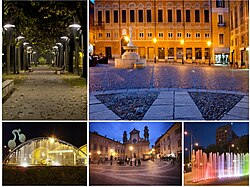Novi Ligure
| Novi Ligure | ||
|---|---|---|
| Comune | ||
| Città di Novi Ligure | ||
 
Palazzo Delle Piane.
|
||
|
||
| Location of Novi Ligure in Italy | ||
| Coordinates: 44°45′42″N 08°47′26″E / 44.76167°N 8.79056°ECoordinates: 44°45′42″N 08°47′26″E / 44.76167°N 8.79056°E | ||
| Country | Italy | |
| Region | Piedmont | |
| Province / Metropolitan city | Alessandria (AL) | |
| Frazioni | Barbellotta, Merella | |
| Government | ||
| • Mayor | Lorenzo Robbiano | |
| Area | ||
| • Total | 54.22 km2 (20.93 sq mi) | |
| Elevation | 197 m (646 ft) | |
| Population (31 December 2008) | ||
| • Total | 28,581 | |
| • Density | 530/km2 (1,400/sq mi) | |
| Demonym(s) | Novesi | |
| Time zone | CET (UTC+1) | |
| • Summer (DST) | CEST (UTC+2) | |
| Postal code | 15067 | |
| Dialing code | 0143 | |
| Patron saint | Madonna of the Snow | |
| Saint day | August 5 | |
| Website | Official website | |
Novi Ligure (Nêuve in Ligurian) is a city and comune north of Genoa, in the Piedmont region of the province of Alessandria of northwest Italy.
The town produces food, iron, steel, and textiles. It is an important junction for both road and railroad.
The community of Curtis Nova in 970 was donated by Emperor Otto I to the monastery of St. Salvatore in Pavia, becoming a castle around the year 1000.
Novi was a free commune until 1157, when it fell to Tortona. It was handed over the marquis of Montferrat in 1223, returning briefly to Tortona in 1232–64. In 1353 Giovanni Visconti of Milan and Genoa conquered it. Novi was donated to the latter in 1392, but was occupied by the condottiero Facino Cane in 1409–12. In 1447, after the death of Filippo Maria Visconti, the governors of the city decided to free forever from Milan, and gave it to Genoa. Around this time, a feudal lord Galeazzo Cavanna was Signore di Castel Gazzo, a fortress on the edge of the town. However, the Sforza of Milan retained its possession until the defeat of Ludovico il Moro, when it passed to the French until Andrea Doria conquered the city for Genoa in 1529.
Novi Ligure remained part of the Republic of Genoa until 1805, with the exception of a brief Austrian-Piedmontese occupation in 1745–46. In 1799 it was the site of a French defeat by an Austro-Russian army, in which the French commander Joubert was killed.
...
Wikipedia


